Report on Cyber Vetting and Employee Relations at Red Company
VerifiedAdded on 2023/04/20
|7
|1526
|299
Report
AI Summary
This report explores the concept of cyber vetting and its potential impact on employees and employers, focusing on Red Company. It examines three scenarios: informing applicants about cyber vetting, using it without informing applicants, and not using it at all. The report discusses the advantages and disadvantages of each scenario, including potential for manipulation, discrimination, and privacy concerns. It suggests that cyber vetting should only be used when relevant to assessing job-related competencies and with the candidate's informed consent. The report concludes that relying on traditional recruitment methods and psychometric testing can be a more ethical and effective approach for Red Company, minimizing legal risks and maintaining a positive employer reputation. Desklib offers a wealth of resources, including past papers and solved assignments, to support students in their academic endeavors.
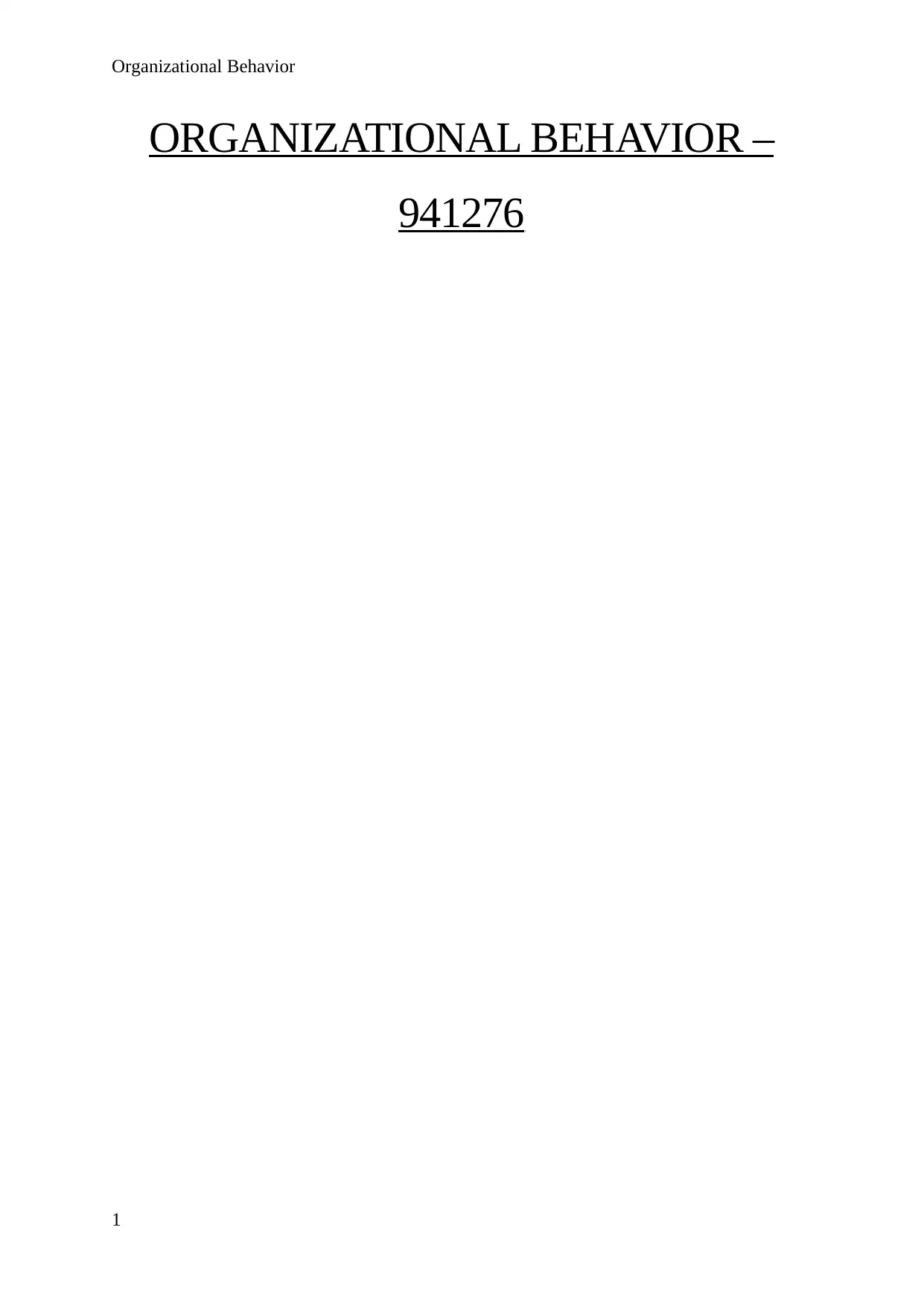
Organizational Behavior
ORGANIZATIONAL BEHAVIOR –
941276
1
ORGANIZATIONAL BEHAVIOR –
941276
1
Paraphrase This Document
Need a fresh take? Get an instant paraphrase of this document with our AI Paraphraser
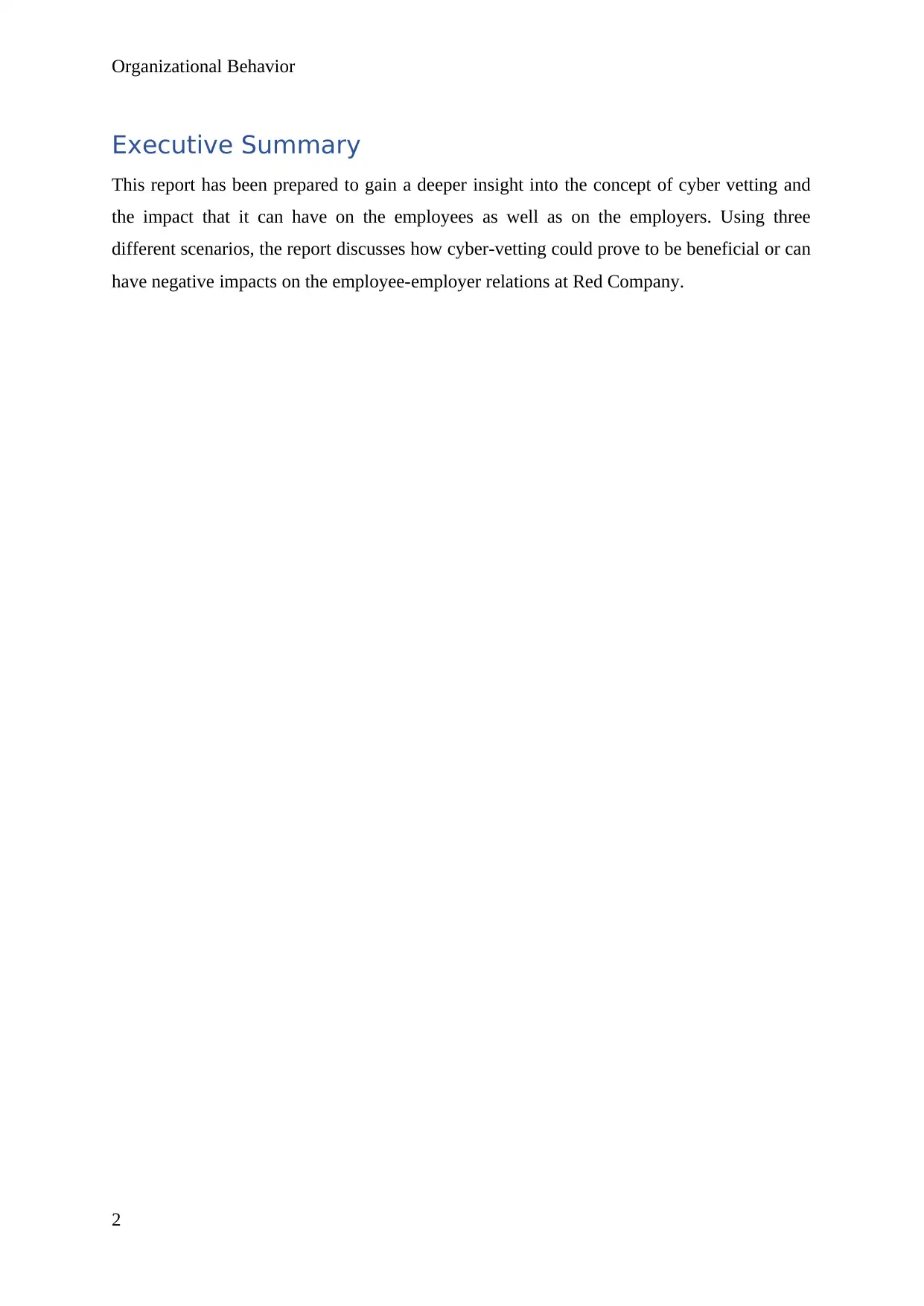
Organizational Behavior
Executive Summary
This report has been prepared to gain a deeper insight into the concept of cyber vetting and
the impact that it can have on the employees as well as on the employers. Using three
different scenarios, the report discusses how cyber-vetting could prove to be beneficial or can
have negative impacts on the employee-employer relations at Red Company.
2
Executive Summary
This report has been prepared to gain a deeper insight into the concept of cyber vetting and
the impact that it can have on the employees as well as on the employers. Using three
different scenarios, the report discusses how cyber-vetting could prove to be beneficial or can
have negative impacts on the employee-employer relations at Red Company.
2
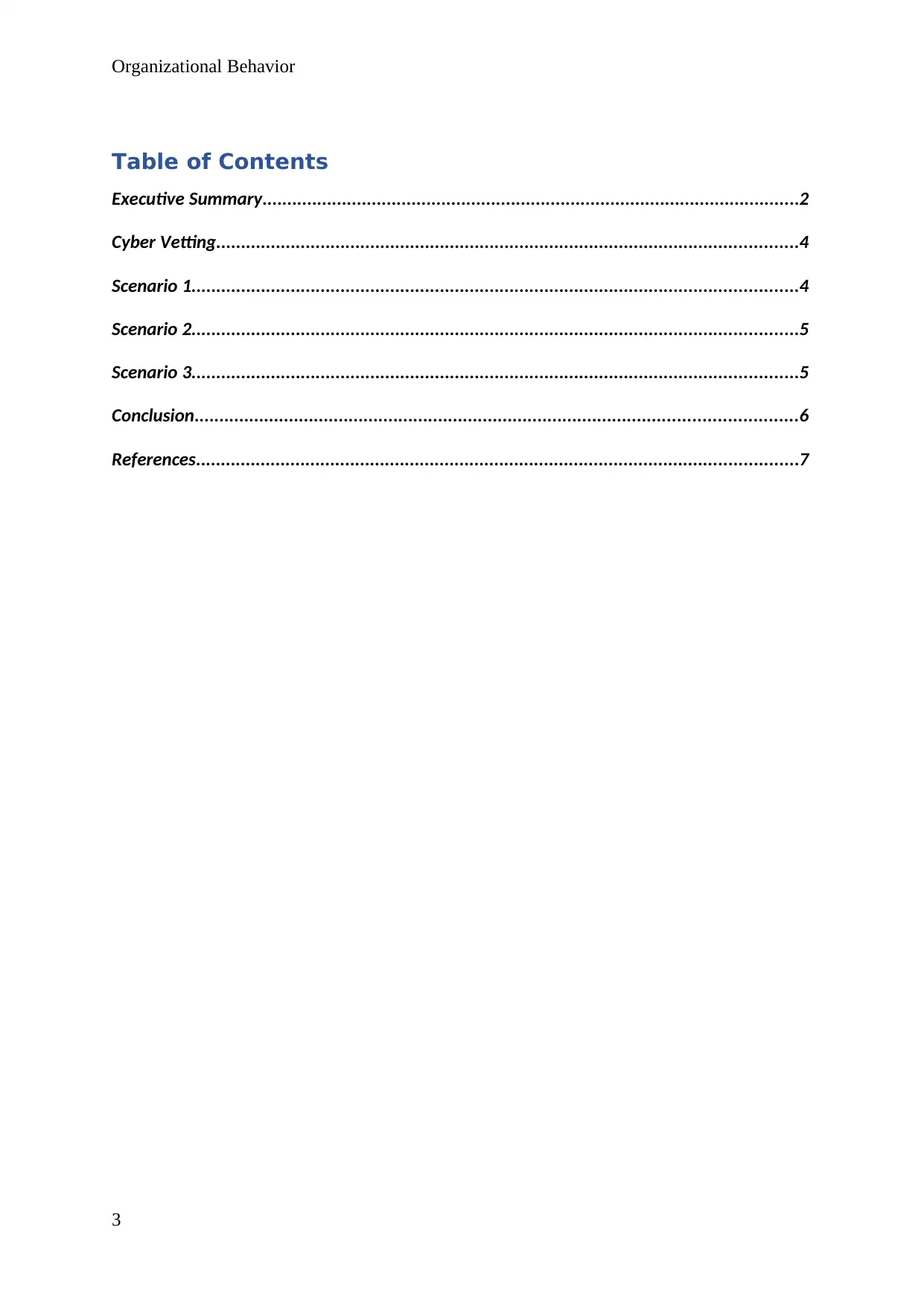
Organizational Behavior
Table of Contents
Executive Summary............................................................................................................2
Cyber Vetting.....................................................................................................................4
Scenario 1..........................................................................................................................4
Scenario 2..........................................................................................................................5
Scenario 3..........................................................................................................................5
Conclusion.........................................................................................................................6
References.........................................................................................................................7
3
Table of Contents
Executive Summary............................................................................................................2
Cyber Vetting.....................................................................................................................4
Scenario 1..........................................................................................................................4
Scenario 2..........................................................................................................................5
Scenario 3..........................................................................................................................5
Conclusion.........................................................................................................................6
References.........................................................................................................................7
3
⊘ This is a preview!⊘
Do you want full access?
Subscribe today to unlock all pages.

Trusted by 1+ million students worldwide
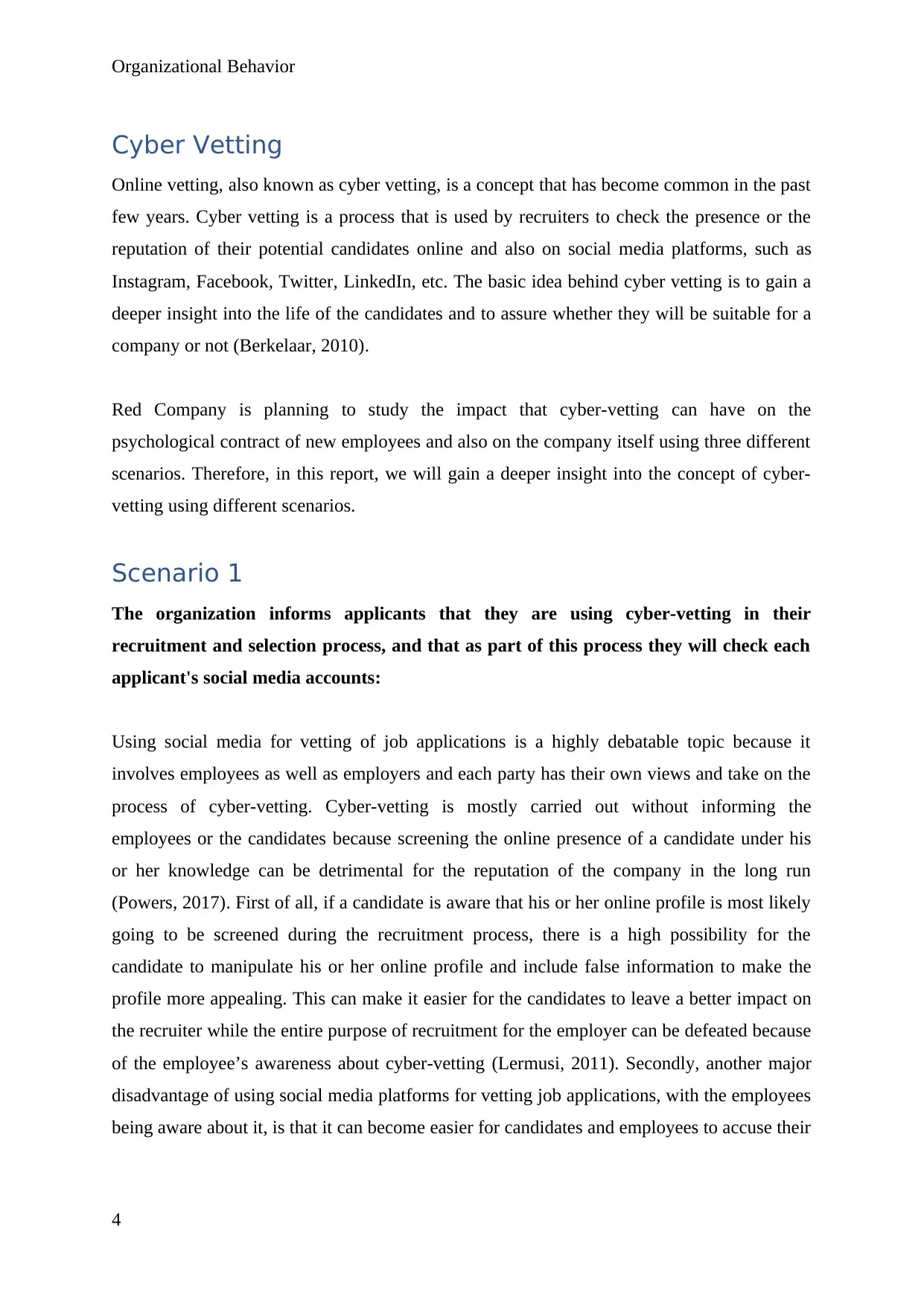
Organizational Behavior
Cyber Vetting
Online vetting, also known as cyber vetting, is a concept that has become common in the past
few years. Cyber vetting is a process that is used by recruiters to check the presence or the
reputation of their potential candidates online and also on social media platforms, such as
Instagram, Facebook, Twitter, LinkedIn, etc. The basic idea behind cyber vetting is to gain a
deeper insight into the life of the candidates and to assure whether they will be suitable for a
company or not (Berkelaar, 2010).
Red Company is planning to study the impact that cyber-vetting can have on the
psychological contract of new employees and also on the company itself using three different
scenarios. Therefore, in this report, we will gain a deeper insight into the concept of cyber-
vetting using different scenarios.
Scenario 1
The organization informs applicants that they are using cyber-vetting in their
recruitment and selection process, and that as part of this process they will check each
applicant's social media accounts:
Using social media for vetting of job applications is a highly debatable topic because it
involves employees as well as employers and each party has their own views and take on the
process of cyber-vetting. Cyber-vetting is mostly carried out without informing the
employees or the candidates because screening the online presence of a candidate under his
or her knowledge can be detrimental for the reputation of the company in the long run
(Powers, 2017). First of all, if a candidate is aware that his or her online profile is most likely
going to be screened during the recruitment process, there is a high possibility for the
candidate to manipulate his or her online profile and include false information to make the
profile more appealing. This can make it easier for the candidates to leave a better impact on
the recruiter while the entire purpose of recruitment for the employer can be defeated because
of the employee’s awareness about cyber-vetting (Lermusi, 2011). Secondly, another major
disadvantage of using social media platforms for vetting job applications, with the employees
being aware about it, is that it can become easier for candidates and employees to accuse their
4
Cyber Vetting
Online vetting, also known as cyber vetting, is a concept that has become common in the past
few years. Cyber vetting is a process that is used by recruiters to check the presence or the
reputation of their potential candidates online and also on social media platforms, such as
Instagram, Facebook, Twitter, LinkedIn, etc. The basic idea behind cyber vetting is to gain a
deeper insight into the life of the candidates and to assure whether they will be suitable for a
company or not (Berkelaar, 2010).
Red Company is planning to study the impact that cyber-vetting can have on the
psychological contract of new employees and also on the company itself using three different
scenarios. Therefore, in this report, we will gain a deeper insight into the concept of cyber-
vetting using different scenarios.
Scenario 1
The organization informs applicants that they are using cyber-vetting in their
recruitment and selection process, and that as part of this process they will check each
applicant's social media accounts:
Using social media for vetting of job applications is a highly debatable topic because it
involves employees as well as employers and each party has their own views and take on the
process of cyber-vetting. Cyber-vetting is mostly carried out without informing the
employees or the candidates because screening the online presence of a candidate under his
or her knowledge can be detrimental for the reputation of the company in the long run
(Powers, 2017). First of all, if a candidate is aware that his or her online profile is most likely
going to be screened during the recruitment process, there is a high possibility for the
candidate to manipulate his or her online profile and include false information to make the
profile more appealing. This can make it easier for the candidates to leave a better impact on
the recruiter while the entire purpose of recruitment for the employer can be defeated because
of the employee’s awareness about cyber-vetting (Lermusi, 2011). Secondly, another major
disadvantage of using social media platforms for vetting job applications, with the employees
being aware about it, is that it can become easier for candidates and employees to accuse their
4
Paraphrase This Document
Need a fresh take? Get an instant paraphrase of this document with our AI Paraphraser
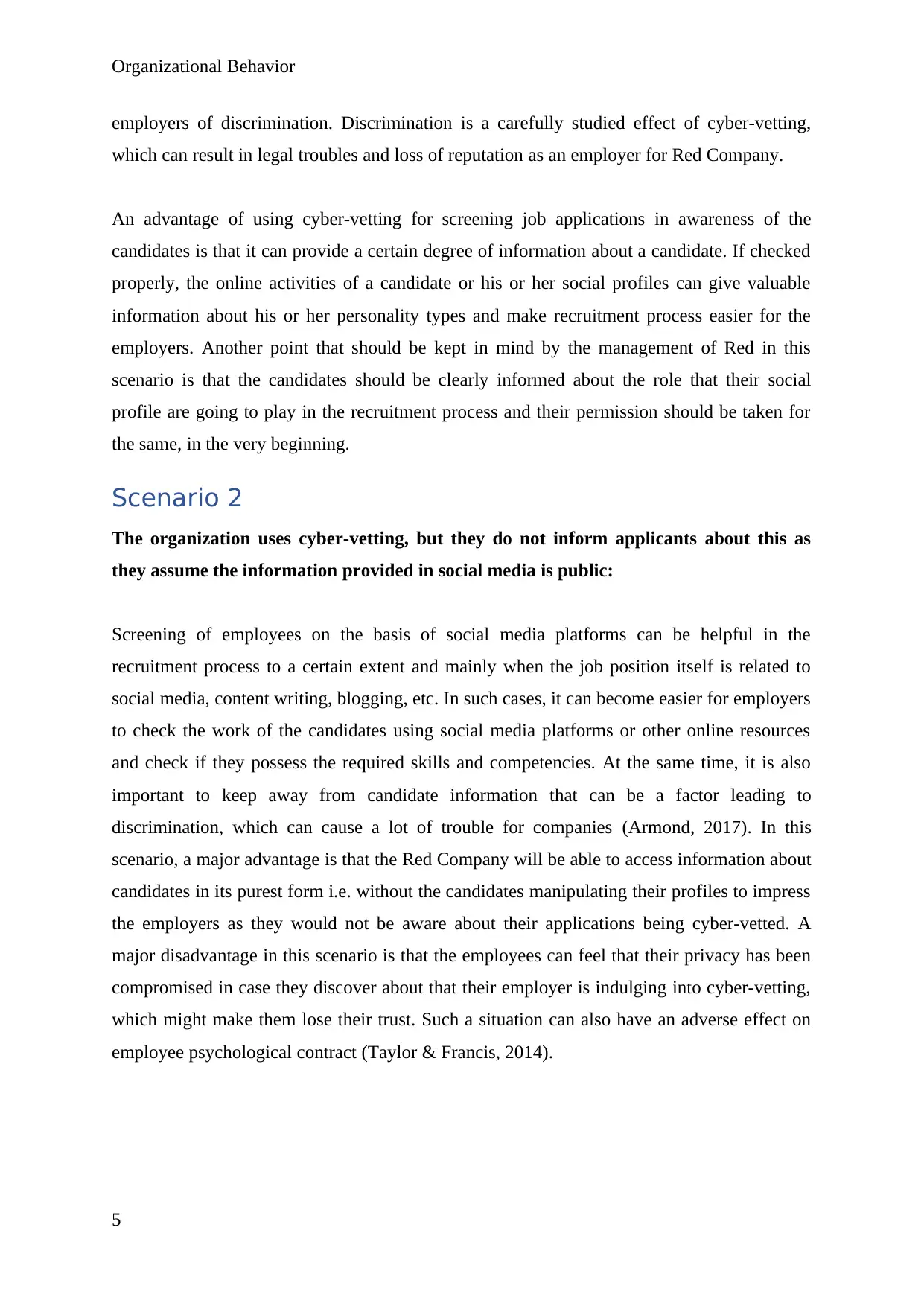
Organizational Behavior
employers of discrimination. Discrimination is a carefully studied effect of cyber-vetting,
which can result in legal troubles and loss of reputation as an employer for Red Company.
An advantage of using cyber-vetting for screening job applications in awareness of the
candidates is that it can provide a certain degree of information about a candidate. If checked
properly, the online activities of a candidate or his or her social profiles can give valuable
information about his or her personality types and make recruitment process easier for the
employers. Another point that should be kept in mind by the management of Red in this
scenario is that the candidates should be clearly informed about the role that their social
profile are going to play in the recruitment process and their permission should be taken for
the same, in the very beginning.
Scenario 2
The organization uses cyber-vetting, but they do not inform applicants about this as
they assume the information provided in social media is public:
Screening of employees on the basis of social media platforms can be helpful in the
recruitment process to a certain extent and mainly when the job position itself is related to
social media, content writing, blogging, etc. In such cases, it can become easier for employers
to check the work of the candidates using social media platforms or other online resources
and check if they possess the required skills and competencies. At the same time, it is also
important to keep away from candidate information that can be a factor leading to
discrimination, which can cause a lot of trouble for companies (Armond, 2017). In this
scenario, a major advantage is that the Red Company will be able to access information about
candidates in its purest form i.e. without the candidates manipulating their profiles to impress
the employers as they would not be aware about their applications being cyber-vetted. A
major disadvantage in this scenario is that the employees can feel that their privacy has been
compromised in case they discover about that their employer is indulging into cyber-vetting,
which might make them lose their trust. Such a situation can also have an adverse effect on
employee psychological contract (Taylor & Francis, 2014).
5
employers of discrimination. Discrimination is a carefully studied effect of cyber-vetting,
which can result in legal troubles and loss of reputation as an employer for Red Company.
An advantage of using cyber-vetting for screening job applications in awareness of the
candidates is that it can provide a certain degree of information about a candidate. If checked
properly, the online activities of a candidate or his or her social profiles can give valuable
information about his or her personality types and make recruitment process easier for the
employers. Another point that should be kept in mind by the management of Red in this
scenario is that the candidates should be clearly informed about the role that their social
profile are going to play in the recruitment process and their permission should be taken for
the same, in the very beginning.
Scenario 2
The organization uses cyber-vetting, but they do not inform applicants about this as
they assume the information provided in social media is public:
Screening of employees on the basis of social media platforms can be helpful in the
recruitment process to a certain extent and mainly when the job position itself is related to
social media, content writing, blogging, etc. In such cases, it can become easier for employers
to check the work of the candidates using social media platforms or other online resources
and check if they possess the required skills and competencies. At the same time, it is also
important to keep away from candidate information that can be a factor leading to
discrimination, which can cause a lot of trouble for companies (Armond, 2017). In this
scenario, a major advantage is that the Red Company will be able to access information about
candidates in its purest form i.e. without the candidates manipulating their profiles to impress
the employers as they would not be aware about their applications being cyber-vetted. A
major disadvantage in this scenario is that the employees can feel that their privacy has been
compromised in case they discover about that their employer is indulging into cyber-vetting,
which might make them lose their trust. Such a situation can also have an adverse effect on
employee psychological contract (Taylor & Francis, 2014).
5
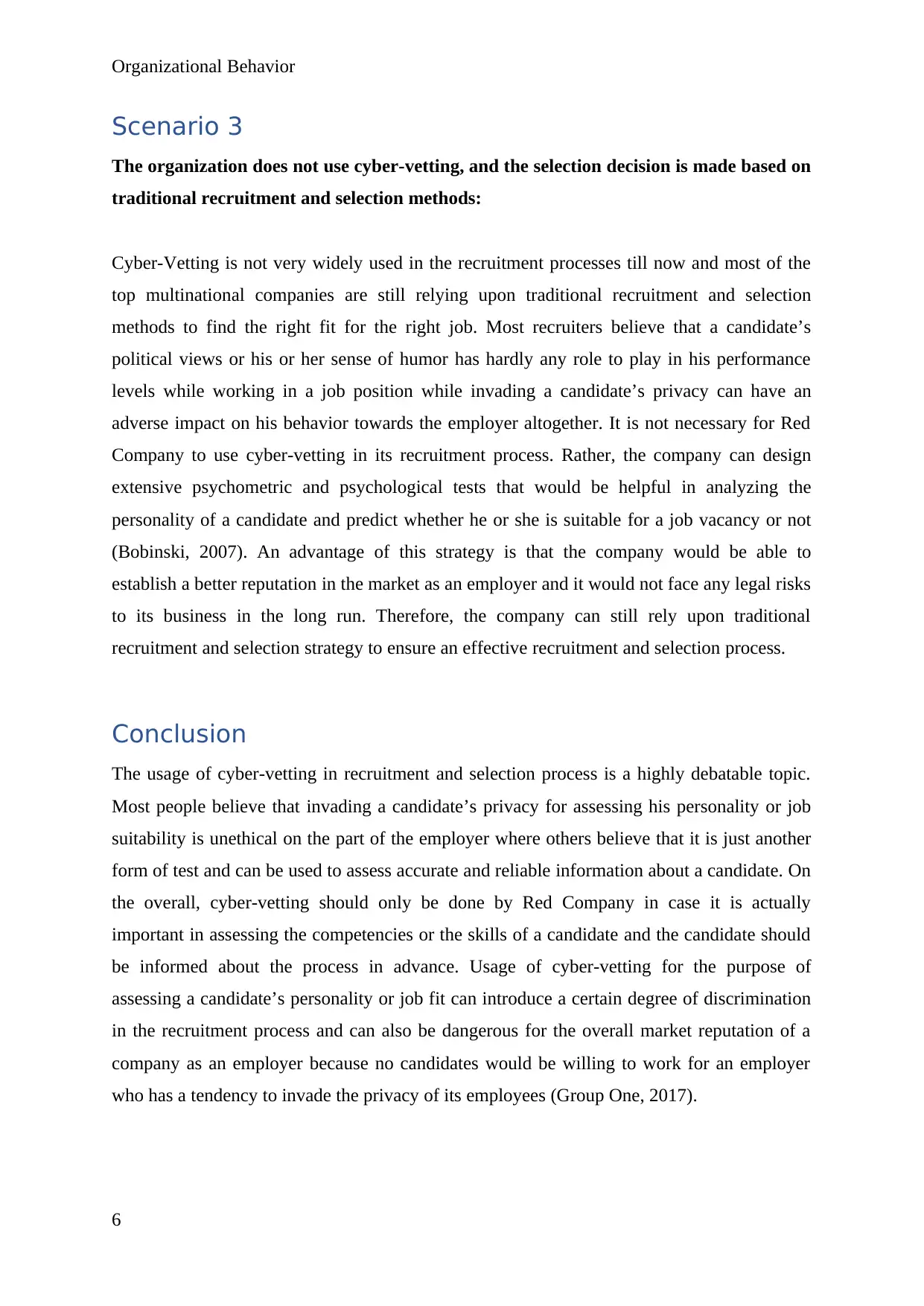
Organizational Behavior
Scenario 3
The organization does not use cyber-vetting, and the selection decision is made based on
traditional recruitment and selection methods:
Cyber-Vetting is not very widely used in the recruitment processes till now and most of the
top multinational companies are still relying upon traditional recruitment and selection
methods to find the right fit for the right job. Most recruiters believe that a candidate’s
political views or his or her sense of humor has hardly any role to play in his performance
levels while working in a job position while invading a candidate’s privacy can have an
adverse impact on his behavior towards the employer altogether. It is not necessary for Red
Company to use cyber-vetting in its recruitment process. Rather, the company can design
extensive psychometric and psychological tests that would be helpful in analyzing the
personality of a candidate and predict whether he or she is suitable for a job vacancy or not
(Bobinski, 2007). An advantage of this strategy is that the company would be able to
establish a better reputation in the market as an employer and it would not face any legal risks
to its business in the long run. Therefore, the company can still rely upon traditional
recruitment and selection strategy to ensure an effective recruitment and selection process.
Conclusion
The usage of cyber-vetting in recruitment and selection process is a highly debatable topic.
Most people believe that invading a candidate’s privacy for assessing his personality or job
suitability is unethical on the part of the employer where others believe that it is just another
form of test and can be used to assess accurate and reliable information about a candidate. On
the overall, cyber-vetting should only be done by Red Company in case it is actually
important in assessing the competencies or the skills of a candidate and the candidate should
be informed about the process in advance. Usage of cyber-vetting for the purpose of
assessing a candidate’s personality or job fit can introduce a certain degree of discrimination
in the recruitment process and can also be dangerous for the overall market reputation of a
company as an employer because no candidates would be willing to work for an employer
who has a tendency to invade the privacy of its employees (Group One, 2017).
6
Scenario 3
The organization does not use cyber-vetting, and the selection decision is made based on
traditional recruitment and selection methods:
Cyber-Vetting is not very widely used in the recruitment processes till now and most of the
top multinational companies are still relying upon traditional recruitment and selection
methods to find the right fit for the right job. Most recruiters believe that a candidate’s
political views or his or her sense of humor has hardly any role to play in his performance
levels while working in a job position while invading a candidate’s privacy can have an
adverse impact on his behavior towards the employer altogether. It is not necessary for Red
Company to use cyber-vetting in its recruitment process. Rather, the company can design
extensive psychometric and psychological tests that would be helpful in analyzing the
personality of a candidate and predict whether he or she is suitable for a job vacancy or not
(Bobinski, 2007). An advantage of this strategy is that the company would be able to
establish a better reputation in the market as an employer and it would not face any legal risks
to its business in the long run. Therefore, the company can still rely upon traditional
recruitment and selection strategy to ensure an effective recruitment and selection process.
Conclusion
The usage of cyber-vetting in recruitment and selection process is a highly debatable topic.
Most people believe that invading a candidate’s privacy for assessing his personality or job
suitability is unethical on the part of the employer where others believe that it is just another
form of test and can be used to assess accurate and reliable information about a candidate. On
the overall, cyber-vetting should only be done by Red Company in case it is actually
important in assessing the competencies or the skills of a candidate and the candidate should
be informed about the process in advance. Usage of cyber-vetting for the purpose of
assessing a candidate’s personality or job fit can introduce a certain degree of discrimination
in the recruitment process and can also be dangerous for the overall market reputation of a
company as an employer because no candidates would be willing to work for an employer
who has a tendency to invade the privacy of its employees (Group One, 2017).
6
⊘ This is a preview!⊘
Do you want full access?
Subscribe today to unlock all pages.

Trusted by 1+ million students worldwide
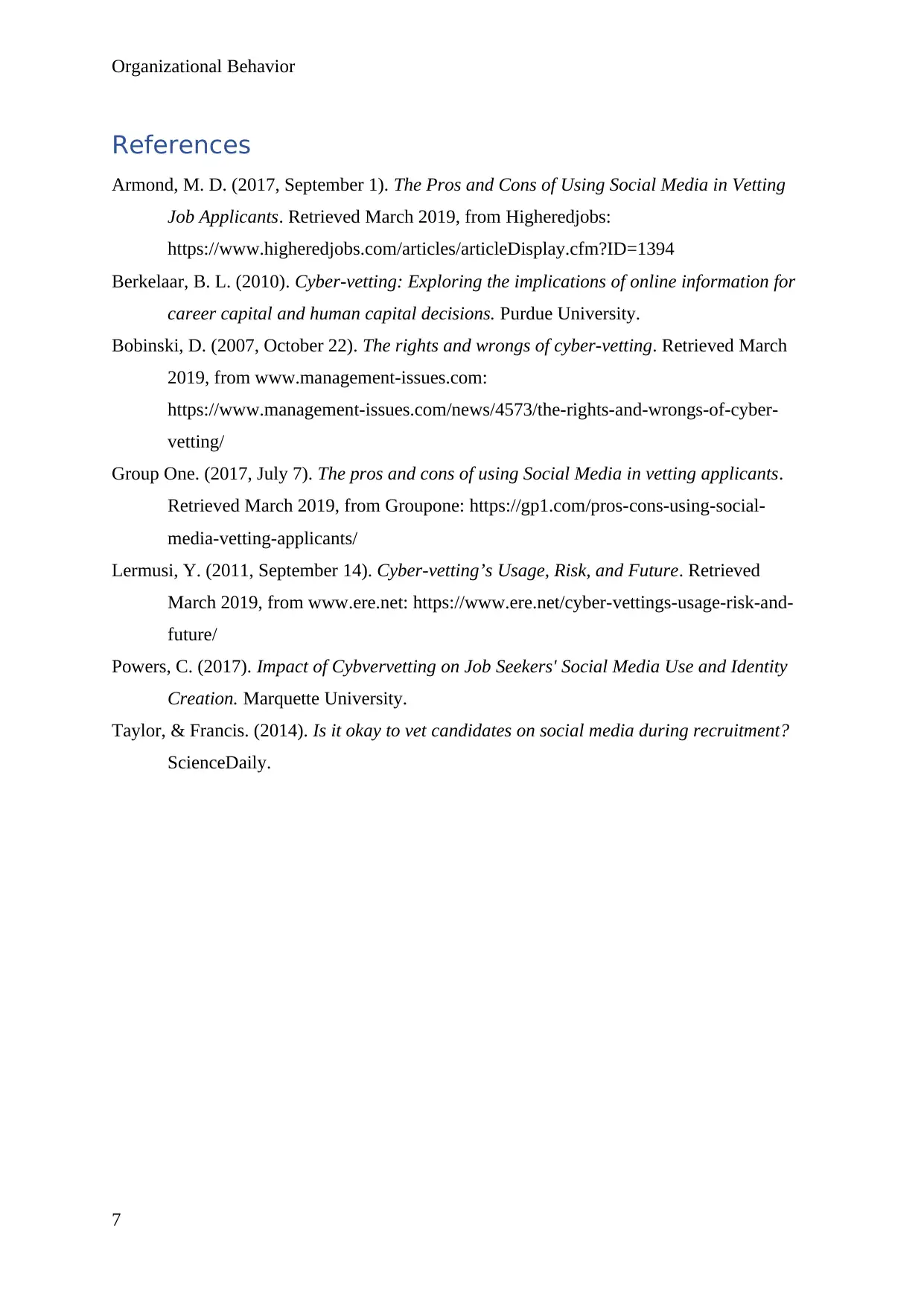
Organizational Behavior
References
Armond, M. D. (2017, September 1). The Pros and Cons of Using Social Media in Vetting
Job Applicants. Retrieved March 2019, from Higheredjobs:
https://www.higheredjobs.com/articles/articleDisplay.cfm?ID=1394
Berkelaar, B. L. (2010). Cyber-vetting: Exploring the implications of online information for
career capital and human capital decisions. Purdue University.
Bobinski, D. (2007, October 22). The rights and wrongs of cyber-vetting. Retrieved March
2019, from www.management-issues.com:
https://www.management-issues.com/news/4573/the-rights-and-wrongs-of-cyber-
vetting/
Group One. (2017, July 7). The pros and cons of using Social Media in vetting applicants.
Retrieved March 2019, from Groupone: https://gp1.com/pros-cons-using-social-
media-vetting-applicants/
Lermusi, Y. (2011, September 14). Cyber-vetting’s Usage, Risk, and Future. Retrieved
March 2019, from www.ere.net: https://www.ere.net/cyber-vettings-usage-risk-and-
future/
Powers, C. (2017). Impact of Cybvervetting on Job Seekers' Social Media Use and Identity
Creation. Marquette University.
Taylor, & Francis. (2014). Is it okay to vet candidates on social media during recruitment?
ScienceDaily.
7
References
Armond, M. D. (2017, September 1). The Pros and Cons of Using Social Media in Vetting
Job Applicants. Retrieved March 2019, from Higheredjobs:
https://www.higheredjobs.com/articles/articleDisplay.cfm?ID=1394
Berkelaar, B. L. (2010). Cyber-vetting: Exploring the implications of online information for
career capital and human capital decisions. Purdue University.
Bobinski, D. (2007, October 22). The rights and wrongs of cyber-vetting. Retrieved March
2019, from www.management-issues.com:
https://www.management-issues.com/news/4573/the-rights-and-wrongs-of-cyber-
vetting/
Group One. (2017, July 7). The pros and cons of using Social Media in vetting applicants.
Retrieved March 2019, from Groupone: https://gp1.com/pros-cons-using-social-
media-vetting-applicants/
Lermusi, Y. (2011, September 14). Cyber-vetting’s Usage, Risk, and Future. Retrieved
March 2019, from www.ere.net: https://www.ere.net/cyber-vettings-usage-risk-and-
future/
Powers, C. (2017). Impact of Cybvervetting on Job Seekers' Social Media Use and Identity
Creation. Marquette University.
Taylor, & Francis. (2014). Is it okay to vet candidates on social media during recruitment?
ScienceDaily.
7
1 out of 7
Related Documents
Your All-in-One AI-Powered Toolkit for Academic Success.
+13062052269
info@desklib.com
Available 24*7 on WhatsApp / Email
![[object Object]](/_next/static/media/star-bottom.7253800d.svg)
Unlock your academic potential
Copyright © 2020–2026 A2Z Services. All Rights Reserved. Developed and managed by ZUCOL.





